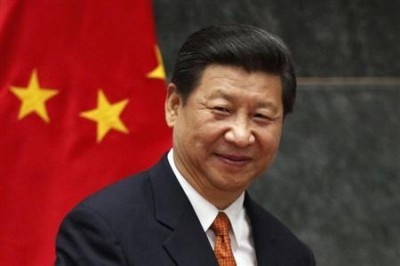Towards a Geopolitical Shift? China’s President Xi Jinping in Tehran

China is Iran’s largest trading partner, including oil and gas, along with billions of dollars in other products and services.
On Friday, President Xi Jinping arrived in Tehran, officially welcomed by Iranian President Hassan Rohani.
The visit was the first by a Chinese head of state in 14 years, Jiang Zemin the last one in 2002, early in the post-9/11 era, featuring endless US imperial wars, along with hostile anti-Russian/anti-Chinese policies.
Presidents Xi and Rohani seek closer ties, Xi signalizing a new chapter in bilateral relations. Iran’s IRNA news agency quoted him saying:
China is seeking to improve bilateral ties with Iran to start a new chapter of comprehensive, long-term and sustainable relations with the Islamic Republic.
Notably, Xi is the first head of state to visit Iran since international sanctions were lifted on January 16. Putin visited Tehran last November, discussing enhanced bilateral ties going forward.
Accompanying Xi on his visit were three deputy prime ministers and six other ministers, along with a large delegation of Chinese business officials
He and Rohani signed 17 documents, involving mutual cooperation in economic, commercial, industrial, transportation, environmental, cultural and judicial relations, including oil and gas, peaceful nuclear energy, financing a bullet train and banking, Xi saying:
In this visit, we have struck an agreement on planning for 25-year-long strategic cooperation and are ready to develop and deepen cooperation in all the various cultural, educational, technological, military and security fields at the level of strategic partners.
Xi criticized Western powers without naming them, saying they seek hegemonic rule – calling George Bush’s “you are either with us or against us” policy “jungle rule.”
Developing economies left Western ones “bereft of their monopolized power…pav(ing) the way for the practice of independent states’ policies.”
He stressed the eagerness of China to enhance ties and cooperation with Iran. Chinese Academy of Social Science Middle East expert Yin Gang called his visit historically significant, signaling enhanced bilateral relations.
“Iran is the place to prove China’s ‘One Belt, One Road’ strategy,” said Yin. Its potential is huge.
Renmin University Chongyang Institute for Financial Studies dean Wang Wen called Iran a hub along the “New Silk Road” route – giving China’s “one Belt, One Road” strategy “solid underpin(ning).”
According to Beijing Ministry of Commerce researcher Mei Xinyu, “Iran is one of the most important players in the region and a key Chinese partner in the Middle East. (It’s) vital for China’s strategies in West Africa and North Asia.”
Besides its huge energy needs vital to its economy, Iran’s large population (nearly 80 million) offers attractive potential for Chinese exports.
In 2014, bilateral trade exceeded $50, Iranian exports totaling $27.5 billion in energy and other products. Chinese oil imports from Iran account for around 12% of its domestic needs, likely increasing ahead with international sanctions lifted.
On Saturday, Xi met with Ayatollah Seyed Ali Khomenei. “Westerners have never obtained the trust of the Iranian nation,” he said.
The government and nation of Iran have always sought expanding relations with independent and trustful countries like China.
Tehran intends increasing ties with the “East.” He praised Beijing’s “independent” stance on global issues, saying “China has always stood by the side of the Iranian nation during hard days.”
America’s approach is “dishonest” on all geopolitical issues, he stressed. Closer Iranian Eastern ties makes it less vulnerable to US-led Western hostility.
Stephen Lendman lives in Chicago. He can be reached at [email protected].
His new book as editor and contributor is titled “Flashpoint in Ukraine: US Drive for Hegemony Risks WW III.”
http://www.claritypress.com/LendmanIII.html
Visit his blog site at sjlendman.blogspot.com.
Listen to cutting-edge discussions with distinguished guests on the Progressive Radio News Hour on the Progressive Radio Network.
It airs three times weekly: live on Sundays at 1PM Central time plus two prerecorded archived programs.

